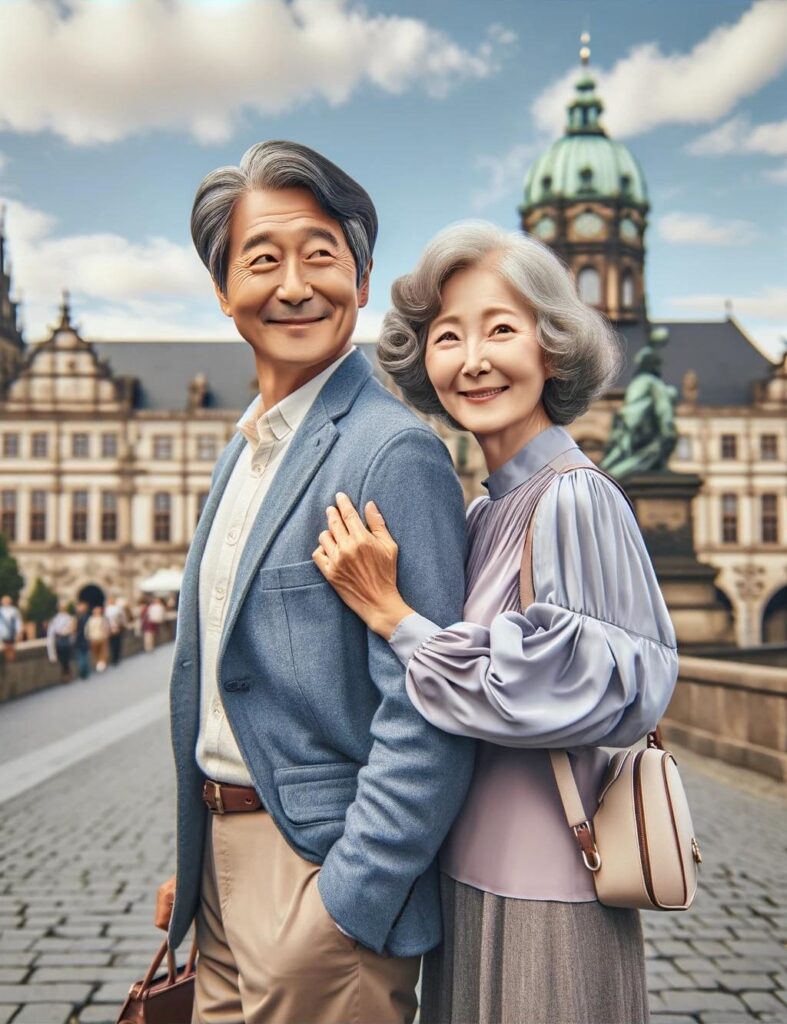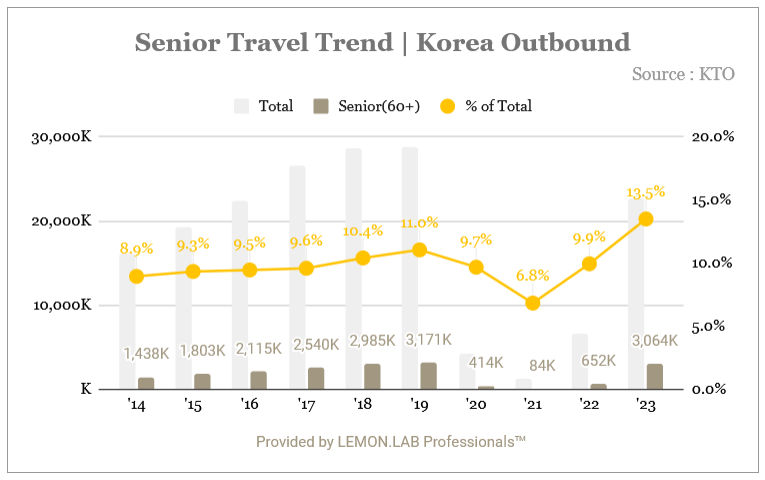Senior
Travel Trend
2024
South Korea
Senior Consumer Market in Korea
Korea is one of the fastest aging nations among advanced countries in the world
According to Statistics Korea and the United Nations (UN) World Population Prospects, the proportion of the elderly aged 65 and over is projected to soar to 47.7% by 2072, ranking Korea as the overwhelming top among the 38 OECD countries. By 2072, it is expected that no other country except Korea will surpass the 40% mark for the proportion of the elderly. The life expectancy of Koreans is projected to reach 91.1 years by 2072, ranking Korea as the top among OECD countries. Following Korea, only five countries including Japan (90.9), Italy, Switzerland (90.3), and Spain (90.0) are expected to exceed the threshold of 90 years. As of 2023, the elderly population aged 65 and over in Korea reached 9,734,411, a 5% increase from 2022, accounting for 19% of the total population, with the population aged 70 and over surpassing that of the population in their 20s for the first time. The UN classifies a society as aged when the proportion of the population aged 65 and over exceeds 7%, as an elderly society when it exceeds 14%, and as a super-aged society when it exceeds 20%. Korea is on the verge of becoming a super-aged society, leading by 1 percentage point. Looking at the average annual growth rate of the elderly population in OECD countries over the past 10 years as of 2021, Korea had the highest rate at 4.4%, which was 1.7 times higher than the OECD average of 2.6%.
Population Aging: A Societal Risk Turned Market Opportunity
The increase in the elderly population is perceived as a crisis from a social perspective but as a new market opportunity from a consumption market perspective. In particular, the “active seniors,” who have both time and economic resources, are showing their presence in the consumer market. According to BC Card, as of August 2023, the proportion of BC card members aged 60 and over reached 27.5%, an increase of 6 percentage points from 21.5% in August 2019, and during the same period, the proportion of payment amounts by customers aged 60 and over increased from 15.9% to 22.9%. According to a survey by KB Kookmin Card, as of 2022, the card payment growth rate among the age group of 50 and over increased by 17% compared to the previous year, which was 6 percentage points higher than the age group of 20-49 (11%).
In the case of Shinsegae Department Store, Korea’s leading luxury department store, the sales of customers aged 60 and over increased by 61.4% compared to 2020, which is about 10 percentage points higher than the overall sales growth rate during the same period. According to department store officials, elderly customers visiting the department store tend to choose products preferred by younger generations rather than products limited to seniors.

“Korea is one of the fastest aging nations among advanced countries in the world. This phenomenon is considered a social risk, but at the same time, it is interpreted as a market opportunity factor.”
Senior Travel Trend
The senior travel market is growing faster than the overall outbound travel market
The overseas travel market for Koreans aged 60 and above is growing at a faster rate than the overall outbound travel market. As of 2023, the senior overseas travel market accounted for 13.5% of the total outbound travel market, with an annual average growth rate of 8.8%, more than double the overall outbound travel market’s annual average growth rate of 3.9%. Its size has been consistently increasing every year, except during the COVID-19 pandemic.

Expansion of senior-specific travel products
With changes in the behavior of the elderly population, such as the active senior trend, the composition and concept of travel products are evolving. Until about a decade ago, overseas travel for those aged 60 and above mainly consisted of special tours where children paid for their parents’ expenses or family trips where three generations traveled together. However, travel agencies are now targeting senior consumers by enhancing premium products with travel themes or senior-friendly itineraries, rather than explicitly labeling them as “senior” or “silver” exclusive products. A travel agency official stated, “Using words like ‘senior,’ ‘silver,’ or ‘filial piety tourism’ on the website is discouraged,” and explained, “As the importance of health management is emphasized and interest in it increases, many people in their 60s these days are as active as people in their 40s used to be.” Furthermore, they added, “Active seniors also prefer schedules with younger people rather than choosing special filial piety tours only with the elderly.”
HanaTour, Korea’s largest travel agency, is expanding travel products themed around humanities, trekking, etc., and strengthening premium products. Another major travel agency, Yellow Balloon Travel, differentiated its travel products under the name “Youth is Now” by dividing the itinerary of visiting major tourist destinations into categories such as “comfortable movement,” “free time,” and “healing in nature.”
LEMON.LAB Professionals™ (“LEMON.LAB”) have deep understanding and insight into Korea’s senior consumer market, including the travel, hospitality, and tourism industries. In particular, we have experience conducting a number of senior travel market surveys, marketing strategy establishment, and revitalization plan consulting for public and private organizations, so we have the ability to carry out a variety of related projects.
For inquiries related to the senior tourism industry, please email chief@lemonlab.pro.
This report has been prepared by the experts at LEMON.LAB Professionals™ (“LEMON.LAB”) to provide general information based on the data they have collected. Various procedures have been followed to verify the accuracy and reliability of the information included in the report, but its completeness is not guaranteed.
This report is not intended to provide advice on specific cases for any particular company or organisation. If specific decision-making is required, please consult with the experts at LEMON.LAB.
Without prior consent from LEMON.LAB, no part or whole of this report may be distributed, quoted, published, or reproduced without authorization.